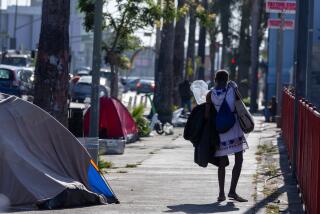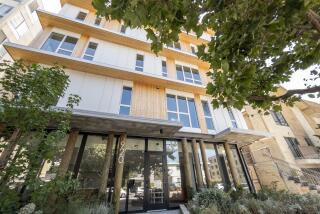L.A. County sales tax hike for transit hits roadblock
Illustrating how politically difficult it is to tackle traffic in Los Angeles County, the Board of Supervisors failed Tuesday to back a proposed half-cent sales tax increase that could raise up to $40 billion for roads and mass transit.
The supervisors’ surprising inability to muster a simple majority to place the proposal on the Nov. 4 ballot does not kill the tax effort, but makes it more complicated and perhaps more costly.
If the Legislature gives its blessing, county election officials would create a separate “conditional” ballot that general election voters would also consider. Officials said the cost of a second ballot could be as much as $3 million.
On Thursday, a key committee of state lawmakers is scheduled to take up a bill that would authorize a sales tax election.
But even that bill, AB 2321, has been slowed by squabbling among politicians who want more of the tax money to pay for work in their districts, since construction could trigger millions of dollars in jobs and development over the next three decades.
Eastside and San Gabriel Valley officials want more for extending light rail lines east of downtown. Westside officials want the focus on relieving congestion in their area and starting the so-called subway to the sea.
Supervisor Zev Yaroslavsky called the supervisors’ vote “silly and costly.” He also said that “this is the first time in my career, which has spanned 33 years, that I have ever seen a Board of Supervisors ever refuse to consolidate an election,” using the technical term for approving a ballot item.
Yaroslavsky said he hopes his colleagues will vote to reconsider their action at next Tuesday’s meeting.
Last month, the sales tax proposal was approved by the Metropolitan Transportation Authority board, whose members include the five county supervisors. At that time, Supervisor Mike Antonovich voted no, Supervisor Gloria Molina abstained and Supervisor Don Knabe was absent.
On Tuesday, Antonovich and Knabe voted no and Molina again abstained. All three then voted against reconsidering their action.
Minutes later, MTA Chief Executive Roger Snoble said the agency would sue to force a consolidated ballot.
“I’m in the process of hiring outside counsel, because we can’t hire county counsel because they would have a conflict,” Snoble said. “We have a fairly decent chance of going into court and getting that reversed.”
Los Angeles Mayor Antonio Villaraigosa also sent a letter to the supervisors, asking them to reconsider. “No matter how you cut it,” he wrote, “the taxpayers and voters will be the ultimate losers if the board refuses to place the MTA measure on the general election ballot.”
The measure, he continued, would be “a down payment toward the many transit and highway improvements this county needs to support our economy, our environment, the needs of the transit-dependent and an overall high quality of life for the people we represent.
“The people of Los Angeles County should have the right to decide for themselves whether they want to invest in their future,” the mayor concluded.
Registrar-Recorder/County Clerk Dean Logan, who oversees county elections, told supervisors that a different type of ballot might have to be used for a separate sales tax measure because vote-counting machines might not be able to handle two elections simultaneously.
Many politicians, including Yaroslavsky and Supervisor Yvonne B. Burke, have hailed the sales tax increase as the county’s best shot at getting a pot of money that would be controlled locally. Budget woes, the economy and the wars in Iraq and Afghanistan have made it all but impossible to obtain state or federal money of that magnitude.
And backers of the measure argue that a sales tax hike is the surest way to build costly projects such as the subway, a Gold Line extension to Azusa, the Expo Line, a busway or light rail along Crenshaw Boulevard and other projects.
But with the prospect of $30 billion to $40 billion in revenue, local, state and federal elected officials have been scurrying to insert language into the authorizing legislation to ensure that their pet projects get moved to the front of the line.
During Tuesday’s meeting, three supervisors complained that the MTA’s spending plan still didn’t fairly distribute the money throughout the county.
Molina said the plan was a scheme to “get more for one side of town versus the other side.” She later added: “It’s a very funny way this little choo-choo is getting on the ballot.”
Antonovich said the money should be split up on a per capita basis and complained that sales tax revenue for some projects -- such as $1 billion earmarked for mass transit along the 405 Freeway through the Sepulveda Pass -- would probably be diverted to pay for the more costly subway.
“It’s like a totalitarian country where I’m just following orders,” Antonovich said, adding that the MTA should try again next year. “Somebody has to stand up and say this is nonsense.”
Knabe, a fiscal conservative, initially said he would vote to put the tax increase on the ballot to avoid having taxpayers pay for the symbolic vote he wanted to cast against it. He said he thinks the current spending plan is unfair to the south county district he represents. Then he reversed course and voted against the tax.
After hearing more about the potential problems a separate ballot could cause, Knabe asked his colleagues to reconsider the earlier vote -- then voted against reconsideration.
“I think it got everybody’s attention that there is an equity issue here,” Knabe said, adding that he expects the MTA to successfully sue the county.
Transit advocates and others expressed frustration over the day’s events.
The Los Angeles Area Chamber of Commerce issued a statement denouncing the vote, even though the chamber has yet to take an official position on the sales tax proposal.
“Voters should be allowed to consider all potential solutions, including a half-cent sales tax increase to fund transportation projects,” Gary Toebben, chamber president and chief executive, said in a statement.
Dana Gabbard of Southern California Transit Advocates said supervisors failed to understand that people from their districts travel into other districts and would benefit from the projects.
“Are they afraid someone across the fence will get more” than them? Gabbard said. “The parochialism in this just boggles the mind.”
--
garrett.therolf@latimes.com
More to Read
Sign up for Essential California
The most important California stories and recommendations in your inbox every morning.
You may occasionally receive promotional content from the Los Angeles Times.










